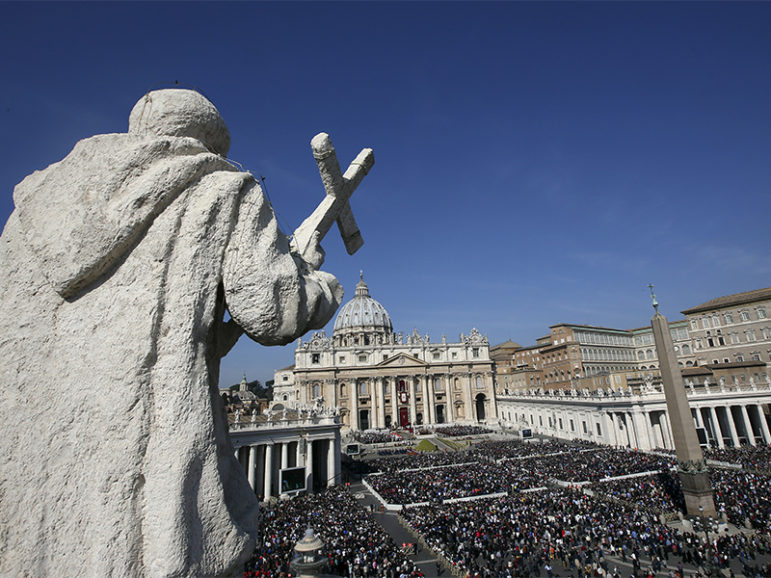(RNS) It seems to happen every 500 years.
One thousand years ago, Roman Catholicism and Eastern Orthodoxy split over language about the Trinity, use of unleavened bread for the Eucharist, and papal supremacy.
Five hundred years ago, the Protestant Reformation kicked off with Luther’s 95 theses against the sale of Indulgences.
Now, after four Roman cardinals publicly questioned Pope Francis’ evident readiness to let divorced and remarried Catholics take Communion on a case-by-case basis, talk of schism is in the air.
My nickel is on it not happening. Oh, maybe a few traditionalists will decide to hop over to the Society of St. Pius X or form a splinter True Church of their own. But most conservatives will be content to wait for the demise of the elderly pope in hopes of a restoration of the pre-Francis status quo.
Still, the distress on the Catholic right is striking. A good barometer is New York Times columnist Ross Douthat, who followed up last Sunday’s column on “Catholicism’s civil war” with a long blog post yesterday titled “The End of Catholic Marriage.”
His idea is that if Pope Francis has his way, marriage in the Catholic Church will be headed down the slippery slope to Protestantism.
It is [a] reasonable-sounding response to modern realities; so is Episcopalianism. But it is not an approach that treats Christian marriage as actually indissoluble, actually real in a way that transcends the subjective experiences of the spouses, and a Catholicism that takes this approach can claim to believe in its historic teaching on marriage only in the most vaporous of ways — which is to say, not.
Well yes, though it’s worth pointing out that Catholicism’s “historic teaching on marriage” has evolved a good deal over time, starting with a powerful preference for the celibate state (cf. St. Paul); not getting around to defining marriage as a sacrament until the 12th century; and waiting until the 20th to link it metaphysically to Eucharist and Church.
Also, we should bear in mind that divorce is permitted throughout the Abrahamic tradition — in Judaism, Islam, Mormonism (where marriage is exalted far beyond anything imagined in Catholicism), and Eastern Orthodoxy. In the Christian tradition, Roman Catholicism has stood alone in preventing the divorced and remarried from taking Communion.
The contrast with Eastern Orthodoxy is highly significant. As has occasionally been noted in the course of this Catholic civil war, Orthodoxy treats marriage under the rubric of oikonomia, a term used in the Greek New Testament to indicate “management” or “stewardship” on the part of those in charge of leading the church.
In the hands of the 4th-century Cappadocian fathers (Sts. Basil the Great, Gregory of Nyssa, and Gregory of Nazianzus), oikonomia became a means by which church practice recognizes the fallen state of the world — that sometimes the world requires us to act in ways that are immoral.
Thus, killing is forbidden but sometimes wars must be fought. Marriage is indissoluble but sometimes must be dissolved. Oikonomia demands repentance for sin but refuses to bar the sacramental path to godliness.
So Orthodox divorcees may remarry (twice) in church, but the liturgy is penitential.
Although the Cappadocian fathers are as canonical for Roman Catholicism as they are for Eastern Orthodoxy, Catholic doctrine chose instead to follow the lead of Augustine of Hippo, the slightly later saint who wrote in Latin and whose massive theological output bestrides the Western church like a colossus. A Manichee in his youth, Augustine remained a dualist always at pains to distinguish the good from the bad, the sheep from the goats.
For him, wars were either just or unjust. Marriages were indissoluble. Period.
Conservative Catholics want to make sure that no goats make their way to the Communion rail. Pope Francis has something more like the Eastern Orthodox approach in mind.
Whether Roman Catholicism has the intellectual capacity to get there is far from clear.






